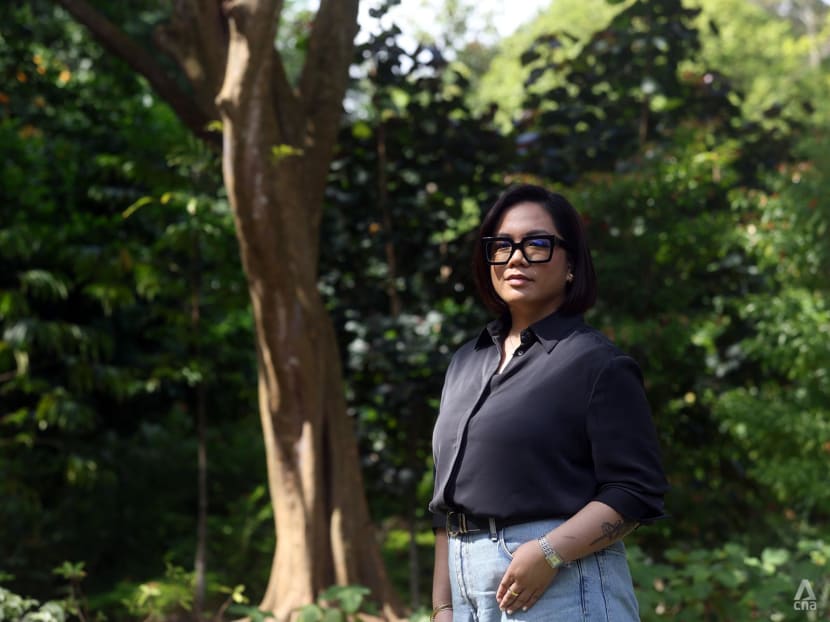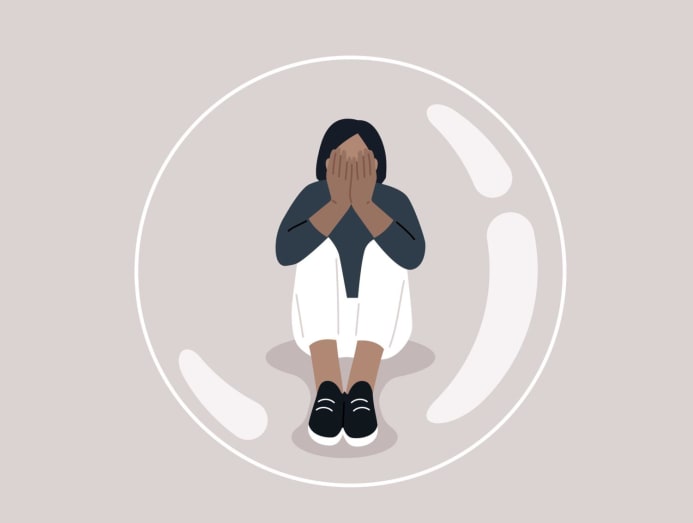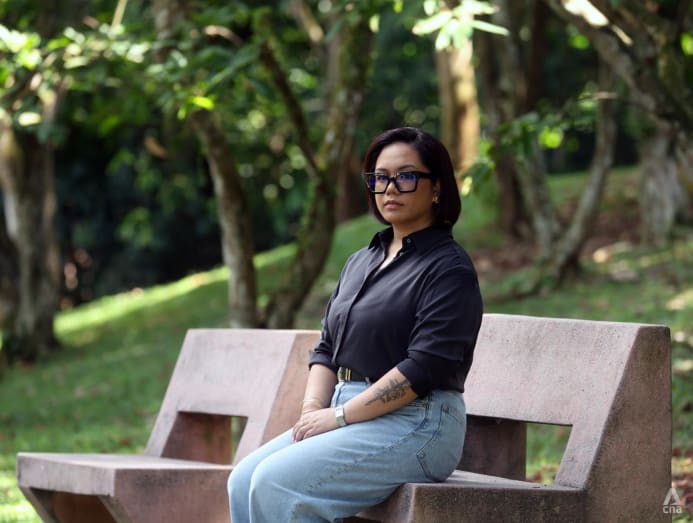I spent my childhood hurt and confused by my parents’ many strict rules. Here’s how I’m healing now
After years of grappling with a deep fear of confrontation that led to depression, anxiety and suicidal thoughts, Ms Maelyn Lagman, 25, is learning to heal her inner wounds, as well as her relationship with her dad and late mum.

Ms Maelyn Lagman (pictured) is learning to deal with the emotional pain that she has suppressed over many years. (Photo: CNA/Ooi Boon Keong)

This audio is generated by an AI tool.
When I started therapy in 2020, the first thing I learnt is that we’re all wired for survival.
In my home, as is often the case in many Asian households, survival meant falling in line with the rules: Get good grades (Mum), never question authority (Dad), keep your mouth shut when being scolded (both).
My parents’ rules weren’t inherently wrong.
Most were founded on good intentions. For instance, I wasn’t allowed to wear anything remotely revealing to prevent me from receiving unwanted male attention – even if it was a normal top that rode slightly lower due to my bustier frame, or shorts that hit mid-thigh instead of the “acceptable” knee length.
I was forbidden from doing anything that could distract me from my studies – like dating – because education was a hard-earned luxury for two Filipino immigrants who had grown up in poverty.
Still, their rules were overwhelmingly rigid, leaving little room for curiosity, wonder or figuring things out on my own terms.
Much to my parents’ frustration, I was never good at obeying or accepting without question. I was always asking why – and it always made Dad immediately upset or angry.
Eventually, we had a big argument where he snapped: “Stop arguing. Just listen. You’re wrong. I’m your dad and I’m always right.”
MORE THAN TEENAGE REBELLION
“Because I said so” may be a foolproof defence for some parents, but it was like pouring gasoline on the fire of my defiance.
I doubled down. If my parents told me not to “argue”, I argued more. If they told me to listen, I tuned out. If they said “do as I say”, I did the exact opposite.
Classic teenage rebellion? In a way, yes. In many others, it’s more than that.
In Asian communities, respect for authority, especially elders, is non-negotiable. Passed down through generations, this is ingrained in the fabric of our lives. Challenging authority isn’t viewed as curiosity but as disrespect – a violation of deeply revered traditions.
Understanding this only tightened the noose around my neck; I wasn’t just defying my parents, I was defying everything they stood for.
Suffocated by rules that I didn’t understand, I craved answers. Why did academic success matter so much? Why should authority be obeyed just because? And why was the simple act of questioning hierarchy all but treated as a coup?
Over time, though, I learnt to swallow my curiosity. Not because I lacked questions – I had plenty – but because I wanted to keep the peace.
But my internal struggle with guilt continued. Every time I questioned my parents’ rules, whether internally or externally, a small voice whispered: You’re being difficult. Ungrateful. Defective.
I wanted autonomy I couldn’t have, but I felt guilty for even wanting it.

SURVIVAL INSTINCTS IN ADULTHOOD
This tension followed me into adulthood, where the survival instincts I’d honed in childhood led me down a never-ending spiral of self-doubt and regret.
At work, I held back from speaking up in meetings or disagreeing with stakeholders, fearing I’d be labelled as difficult or my ideas dismissed as irrelevant or wrong.
I’d watch as colleagues around me voiced thoughts similar to my own, earning the recognition or validation I secretly craved.
Even in casual conversations with friends, I often refrained from sharing my perspective, not even on trivial topics like whether Friends or The Big Bang Theory was the better American TV series.
I always convinced myself that silence was easier than risking conflict – or worse, rejection. But silence comes at a cost.
Over time, the weight of everything I never said built up and I felt increasingly resentful and misunderstood.
I held my tongue, went along with everything said by everyone around me, fearful of rocking the boat. All it did was make me depressed, anxious and, in my lowest points, suicidal.
In 2022, my mum passed away from cancer – and the grief hit me like a tsunami, throwing open the doors for everything I had suppressed since childhood to come flooding back.
At the time, I had just switched to a new therapist who helped me begin unlearning the coping mechanisms that had kept me in survival mode since childhood. For the first time, I felt liberated to express all my thoughts and feelings – even the dark, messy ones.
Strangely enough, embracing my own imperfections helped me to see my parents’.
Slowly, I started to recognise that they weren’t villains trying to control my every move. They were just people navigating life through the lens of their own fears, insecurities and upbringing – imperfect humans, raised by other imperfect humans. Just like me.

HEALING PAST HURTS WITH MY PARENTS
Understanding that my parents were not perfect didn’t erase the harm caused by their stiflingly rigid parenting, but it did open up room within me for compassion, both for my late mum and my existing relationship with my father.
These days, I no longer instinctively respond to Dad from a place of hurt or exasperation. Instead, I try to approach our conversations with curiosity – genuinely wanting to hear his point of view while making sure I express mine.
We hit a rough patch when I started getting tattoos just months after Mum passed. He reacted badly to each one, railing on as if I’d committed a terrible crime when each inking was either a tribute to my mother or a symbol of our Christian faith.
In the face of his rage, I was tempted to fall back on old habits and give him the silent treatment. But I fought my instincts and talked to him about it instead – with an intent to understand, not “win” the argument.
In this conversation, he opened up and shared with me that when he was younger, tattoos symbolised a history of incarceration and therefore, they typically carried many negative connotations including violence and crime. It simply hadn’t occurred to me, since I grew up in a time where tattoos are now celebrated as artistic self-expression.
Dad and I still don’t agree on everything – but I’ve now learnt that we don’t have to. Differing perspectives don’t have to mean conflict. Learning that I could hold space for his perspective and feelings as well as mine was a huge part of my healing.
A HEALTHIER RELATIONSHIP WITH RULES AND BOUNDARIES
My therapist likes to say, “You have to see the problem before you can fix it”. Recognising that my knee-jerk reactions – whether to blindly obey or instantly rebel – were conditioned responses from childhood was just the first step.
I started practising the behaviour of pausing and reflecting before I react. This sounds obvious, but it’s a lot easier said than done.
Instead of snapping back in frustration or staying silent to avoid conflict, I step back, ask myself what I truly want to express, and choose how to respond in a way that feels authentic. Not out of fear or obligation, but from a place of kindness and clarity.
I now see that it’s not about blindly following the rules or rejecting them out of hand. It’s about finding a balance. How can I respect good boundaries set by authority or tradition without losing myself in the process?
I’m still practising, still figuring out how to balance the rules I grew up with and the person I’m becoming.
Maybe I’ll never fully get there, but for now, the work – messy and imperfect as it is – feels like its own kind of freedom.
Maelyn Lagman, 25, currently leads content strategy at a Singapore startup.
If you have an experience to share or know someone who wishes to contribute to this series, write to voices [at] mediacorp.com.sg with your full name, address and phone number.















